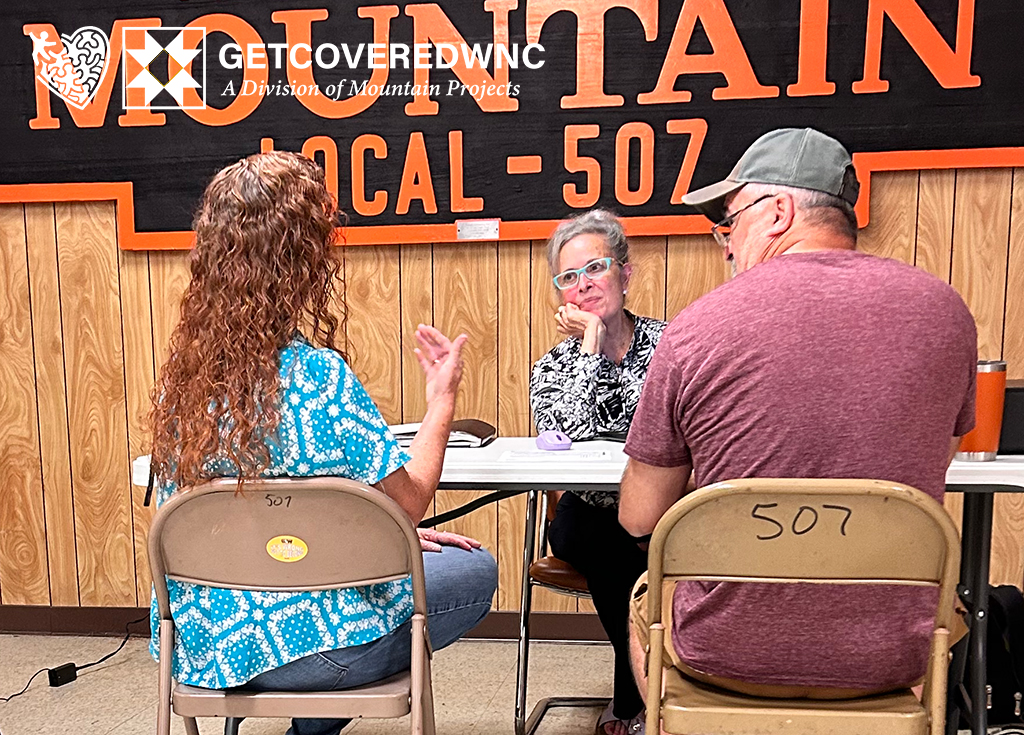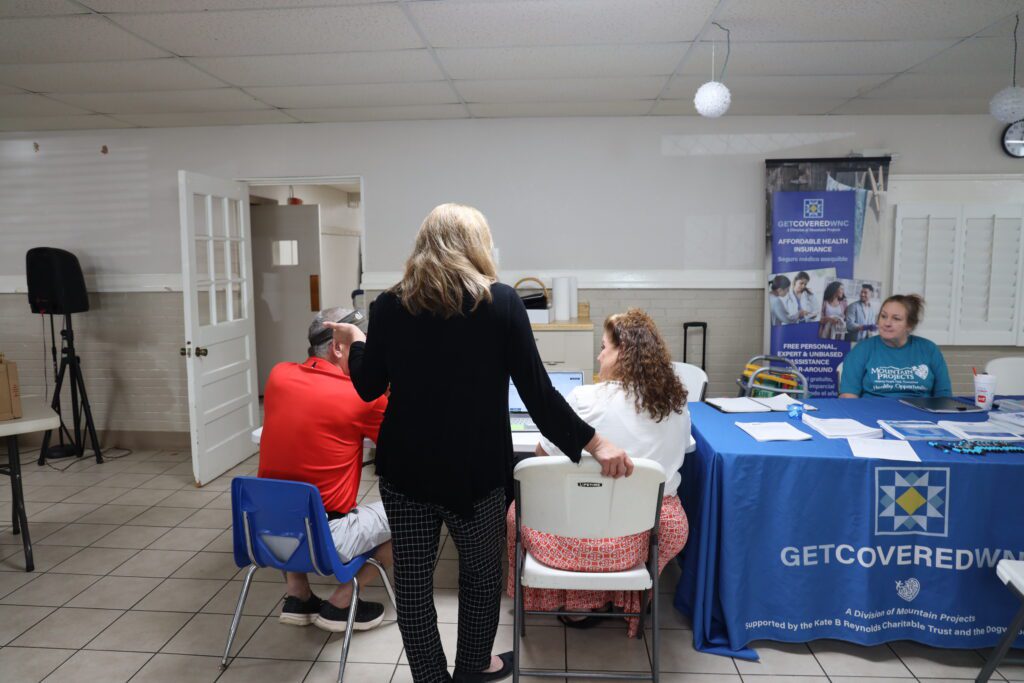
Share this story
|
|
On March 6, 2023, Jan Plummer along with other Haywood community members found out that Pactiv Evergreen, the county’s largest employer, was closing the local paper mill.
Plummer has played a key role in leading a team of health insurance navigators to support workers and their families as they transition their health insurance.
“This is the most important thing, in my opinion, that I’ve ever been involved with in my career,” she says.
How do you avoid a health care crisis when more than 1,000 workers and their dependents lose insurance coverage?
This is a story about banding together and breaking down silos.
This is a story about leadership, partnerships, and the importance of regional philanthropy.
Meet Jan Plummer and the work of Mountain Projects
Jan Plummer has had a mosaic career.
She was a music therapist, then worked in pharmaceuticals sales, and at one point she had a role in skilled nursing. She’s worked in billing, in coding, with worker’s compensation, and right before her current position at Mountain Projects, she worked at Crescent Health Solutions, providing self-funded employers health care options.
In those jobs she was working with patients directly, then within the systems internally, and then as a third party, helping both client and provider make sense to one another.

Now Plummer is a certified health insurance application counselor and program coordinator at Mountain Projects, a nonprofit serving Haywood and Jackson counties that develops and implements programs designed “to improve the social, economic, educational, health, emotional and environmental aspects of the lives of the families and individuals” they serve, according to their website.
Founded in 1965 and born of Lyndon B. Johnson’s “War on Poverty” legislation, this community action agency is focused on the social determinants of health — housing, food insecurity, education, transportation, and more — in order to address systematic causes of poverty.
“It’s been a journey, but I think it’s all worked together, to come to this point,” says Plummer.
Jan worked with the mill workers from Pactiv Evergreen to understand the increased out-of-pocket costs for insurance premiums, and just how devastating it would be if they could not afford insurance.
— David Francis, Haywood County Director Community and Economic Development
If it wasn’t for Jan bringing this problem to light, the Milltown Health Initiative would not have happened.
Jan’s exceptional leadership has helped lessen the financial burden to the mill workers and their families.
The local rapid response team
Plummer was at work when — on the same day the mill closing was announced — she received a phone call from the local rapid response team.
This group formed after the natural disaster caused by Tropical Depression Fred in 2021, which brought historic flooding and landslides to the county.
The economic disaster of the mill closing similarly required immediate action. The first meeting of the team was scheduled that day, Plummer remembers.
The team is spearheaded by David Garrett, the workforce development director of the Southwestern Commission, and consists of representatives from many community partners — nonprofits, governmental agencies, educational institutions, and more.
During the meetings, the team agreed one of the largest problems facing the mill workers would be lapses in health insurance coverage and the attendant health care implications.
Celesa Willett, executive director of United Way of Haywood County, was part of those early meetings and says they leaned on lessons from the Pillowtex closure in Kannapolis.
Willett says, “When Pillowtex closed and and the workers lost insurance, it was a major health care crisis in that community. And so we learned from that, and we learned that if we don’t do something proactive, then we’ll all pay the consequences for it.”
Pre-existing conditions were a concern, especially hypertension and diabetes. Mental health was a concern, especially suicide.
A federal law — the Consolidated Omnibus Reconciliation Act (COBRA) passed in 1985 — gives workers the right to continue health care coverage provided by their former employer. But Pactiv Evergreen only agreed to pay for one month of COBRA coverage, according to the local news, and how workers would afford it without a job was cause for concern.

On May 11, local leaders — including Plummer and Mountain Projects — and state leaders met to discuss the challenges for workers as they transitioned their healthcare coverage to COBRA or a new policy, affordability, and most importantly how to do this well.
In my 30-year career, it was the best example I have seen of what I think of as community solutioning.
Jan Plummer and Celesa Willett both have the compassion and fortitude to make things happen.
— David Francis, Haywood County Director Community and Economic Development
Better is what you can hope for with their collective leadership.
Trusted partners, philanthropic support
This is where the recent history of Haywood County comes into the story.
Mountain Projects already had a grant to help workers navigate the process of deciding which insurance coverage would be best for their families, and Plummer and her team had been meeting with workers.
The problem was how to meet with more of the workers, more of them quickly, and what to do about affordability. Among other financial realities, Plummer had heard stories from workers about rationing insulin.
United Way had worked on and funded recovery efforts after the flooding of 2021, and the county trusted the organization to hold the funding they hoped would come in to support mill workers.
Dogwood Health Trust provided a $1 million grant to the United Way of Haywood County to support the Canton Mill Closure Emergency Response Project, which provides financial assistance to individuals and families in need as a result of the mill closure.
“We are seeing more and more folks coming through now that the reality of the mill closure is setting in,” Plummer said in a local news article. “We are here to listen, answer questions, provide information and walk everyone through health insurance options that are available to them.”
Mountain Projects continues to work with displaced workers exploring all healthcare options, and worked with Blue Cross Blue Shield of North Carolina to bring in extra navigators.
The navigators take into consideration how many people are in the household, if they have met their deductible for the year, and whether a spouse’s health insurance is an option. They layout all the options with the mill workers, giving them the knowledge to pick what is best for them moving forward.
Each situation is unique, and Mountain Projects has the institutional knowledge to navigate the complexities of the health insurance system. More importantly, with 58 years of service to those in the county, it has the trust of the community.
Willett said workers can receive a $500 reimbursement each month for each family member that was on the Pactiv Evergreen health care plan.

“This is filling a gap,” she said.
In July, together Mountain Projects and United Way served 248 people and distributed $38,940.67 in reimbursements.
In August, 247 people were served and $84,758.31 was distributed.
“Having funding to assist with costly premiums is a huge relief to many who are facing the sticker shock of coverage costs,” Plummer said.
“Partnering with Mountain Projects is the easiest thing in the world because we just work well together,” said Willett. “I don’t think we have silos as much as other communities do.”
At least in part, that’s because this community has been through so much.
“We all want to work together for the betterment of the whole community.”
Celesa Willett, executive director of United Way of Haywood County
Next steps in Haywood County and the region
At the end of August, the United Way received a $110,000 grant from the Haywood Healthcare Foundation to provide additional support for mill workers.
Also in August, Dogwood Health Trust made an additional $150,000 contribution to the Forward Fund at The Community Foundation of Western North Carolina (CFWNC), according to this press release.
“Whether responding to severe upheaval like the mill closing, or focusing on long-term strategies for positive change, creating healthy and thriving communities in WNC means working together with multiple partners,” said Dr. Susan Mims, CEO of Dogwood Health Trust.
The Forward Fund was established to support nonprofit organizations and municipalities impacted by the Pactiv Evergreen closure in Canton.
“The closing and its resulting ripple effects are impacting people and communities in several WNC counties,” said CFWNC President Elizabeth Brazas. “A comprehensive response starts with addressing immediate needs and stabilization; longer-term projects and capacity are necessary parts of the transition phase.”
For more information about the economic impact of the mill closing on the region, read this just released report, also funded by Dogwood Health Trust. There will be a webinar on the report and the regional impact on Sept. 21, 2023 at noon. Register to join us here.
Editor’s Note: Dogwood Health Trust supports the work of EducationNC.
Behind the Story
EdNC’s Caroline Parker conducted interviews and research for this article.




